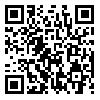1- Assistant Professor, Department of Persian Language and Literature, Faculty of Literature and Human Sciences, Imam Khomeini International University, Qazvin, Iran. , rone@hum.ikiu.ac.ir
Abstract: (12 Views)
Persian novels of the 1930s and 1940s contain common themes such as loneliness, despair, disillusionment, fear and suspicion of personal and social relationships. Taghi Modarresi wroteYakolia & her solitude under the influence of the social-political atmosphere of the 1950, especially the situation after the coup of August 28, 1953. The traces of the author's familiarity with the Holy Book are also evident both in the writing style and in the content of this novel. The suffocating atmosphere of that time forced the writer to express his political concerns behind the myth and symbolic language. Mikhail Lermontov, a Russian poet, was also affected by the political and social situation of Russia, after the failure of the Decembrists' uprising, to escape from the disappointment and rejection of the intelligentsia, he took refuge in biblical myths and composed the narrative poem "Devil" which was a reflection of his frustrations. This research with a comparative approach between these two literary works in a descriptive-analytical method is important, because of The similarity of the social-political origins of the creation of these two works, the thoughts and opinions of the two authors, the common themes and the use of the creators of both works from the Old Testament and the story of "Tamar". This study shows that Modarresi and Lermontov used the story of Tamara in book of Creation and the second part of Samuel from the Bible to create their works, and common themes such as: despair, loneliness, rejection, protest, love, etc
Article Type: Qualitative Research |
Subject:
Comparative research
Received: 2024/06/8 | Accepted: 2024/10/4
Received: 2024/06/8 | Accepted: 2024/10/4
Send email to the article author
| Rights and permissions | |
 |
This work is licensed under a Creative Commons Attribution-NonCommercial 4.0 International License. |

